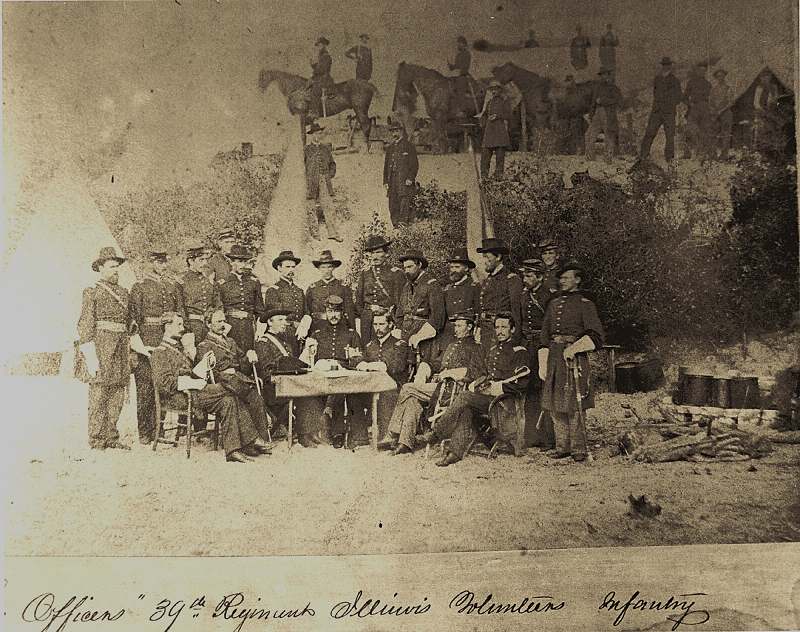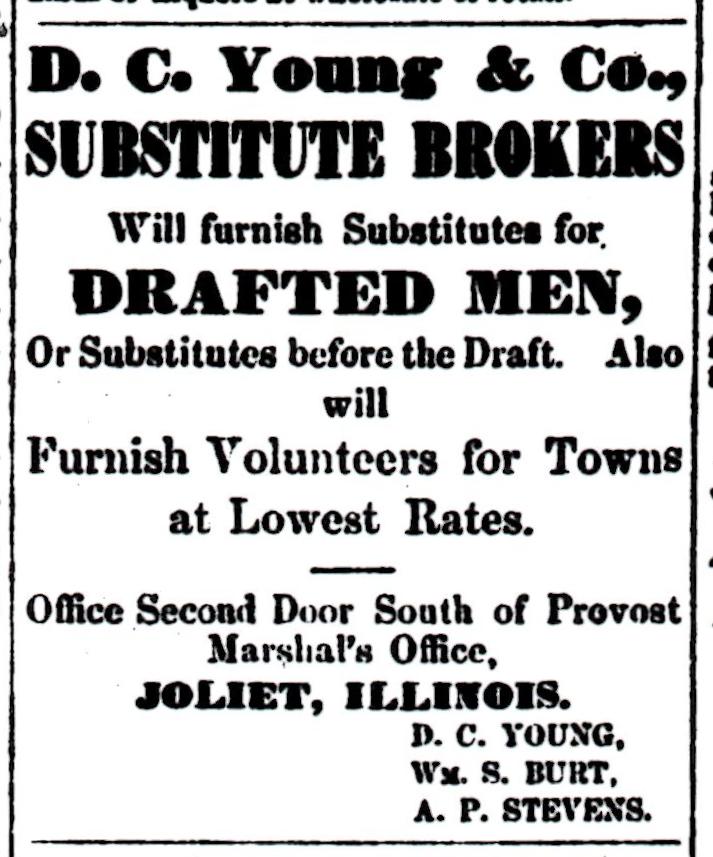Civil War: April and May 1863, watching the war


Ads like this one in the Joliet Signal for a draft replacement office sent some men visiting family and friends in Canada, and others forgoing the hair dye to stop looking younger.
By Sandy Vasko
April of 1863 saw the troops from Will County getting prepared for battle once again. Marches and maneuvers were the order of the day. But for the most part, the boys were still watching the action instead of being in it.
The 20th Illinois Voluntary Infantry, the first to muster in from Will County, had been camped at Lake Providence, Louisiana when on April 18th they were given the order to move out. They boarded the steamer Continental and started down the Mississippi River to a point above Vicksburg called Milliken’s Bend.
General Grant was organizing his campaign to take the rebel stronghold at Vicksburg. The rebel army had set up artillery there that sunk every Union boat that passed by during the day time, and many that tried to run the blockade at night.
On April 21st, nine men from the 20th volunteered to run the blockade on the boats, while the rest were marched overland to Carthage below Vicksburg. In George Woodruff’s history of Will County in the Civil War, he prints a letter from Sgt. James Branch describing this march:
“We started from Milliken’s Bend on the morning of the 25th of April, at 9 o’clock, and marched to Carthage, below Vicksburg. We marched nine miles and encamped. The roads were in good order; ten days before, they would have been impassable.
“It was through a swampy country, and it was plain to be seen that if it rained, we should have fun. And sure enough, on the night of the 26th, it began to rain in earnest, continuing all night. We were without tents, and were well soaked by morning. But no matter, we started on in a terrible thunder storm. Companies F and E were rear guard.
“It rained all day, and of all the roads I ever saw, ours was the worst. That day we passed over a hundred wagons stuck in the mud. We were drenched with water all day. We made six miles, and encamped on an old deserted plantation, and slept in a bed of raw cotton, without blankets, and in our wet clothes.”
They crossed the Mississippi River on gun boats and transports that had run the blockade to get to the Mississippi side of the river. The Battle of Vicksburg was about to begin.
Meanwhile, the 39th had been encamped on St. Helena Island off South Carolina. On April 2nd, they were moved to Folly Island, about 5 miles from Charleston. From the top of a sand hill, they could see the entire harbor along with forts Moultrie, Sumter and Johnson.
On April 7th, they were witness to a fleet of ironclads steaming into Charleston Harbor under Admiral Dupont. One of the regiment describes the scene:
“When the day broke this morning, we discovered that the eminence upon which we had encamped last night about 12, commanded a view of great range. We could see the blockading fleet off Charleston harbor; the ironclads, and the reserve fleet of wooden vessels (known as cheese boxes); Fort Moultrie and the sand batteries on Sullivan’s Island, Cummings Point battery on the end of Morris Island, and Secessionville; the steeples of Charleston; and above all Fort Sumter, with the rebel flags flying defiantly over it.
“Old Sumter loomed up grandly; as we gazed upon its massive walls, we thought bitterly of the startling episode of two years ago. Every heart in the 39th was burning to avenge the insult and treason of that hour.
“Soon we discovered a white flag flying beneath the stars and bars, but it was no flag of peace and submission. Leveling our field glasses, we recognize the ‘Palmetto flag,’ the contemptible rag with which South Carolina opened the rebellion, and displaced the stars and stripes.
“Immediately we saw smoke and heard the roar of heavy guns as Moultrie and Sullivan’s Island opened fire. We could see their flags, but not the works, nor could we see the fleet as yet; but soon the monitors sailed up the channel, and we could see the smoke stacks and turrets. Soon one of them approached very near Sumter and opened fire. The fort was soon hidden by dense clouds of smoke, as in rapid succession it discharged its guns.
“The scene was grand and sublime beyond description. For two hours the fight continued; between four and five Sumter slacked fire, and as the shot and shells of the indomitable ironclads still flew through the air, we expected that the walls of Sumter would soon fly the national colors.
“But the fire was again renewed fiercely by the rebels. Day was drawing to a close, and the fleet firing a parting shot withdrew over the bar, and thus ended the conflict. We rejoiced that when we counted the ‘cheese boxes’ (as they were moving after the huge iron-clad, like ducks following their mother bird,) none were missing, and we supposed that the contest would be renewed in the morning, but we were doomed to disappointment.”
When May of 1863 dawned, fresh with the breath of spring that reminds us how good it is to live on this earth, some from Will County were facing death, while others were in fear that they might have to do just that. The Conscription Act finally showed its teeth in Will County.
George Woodruff wrote: “In May, Captain Abel Longworth, of Morris, was appointed Provost Marshal under the conscription act, S. Simmons of this county being commissioner, and Dr. McArthur, of Ottawa, examining surgeon.
“A draft was evidently being preparing for us. The towns were being enrolled, and the number subject to military duty ascertained. That looked like business. And then, many suddenly remembered that they have friends in Canada, and think it will be a good time to make them a visit. Many were suddenly afflicted with various difficulties and disabilities.
“The demand for hair dye suddenly fell off, as old fogies no longer wished to be thought young, and stopped dyeing their hair and whiskers. It was something wonderful, the transformations that took place.
“Then, too, a new business was devised by the sharp and knowing ones, and substitute brokerage became the road to wealth for many.”
Here we should explain that while there was never anyone actually drafted in Will County, many became rich by becoming a substitute. There were agencies set up, much like job agencies now, that catered to those who needed money and those who thought they would be drafted and had enough money to pay someone else to enlist for them. The agencies took a percentage of the money paid to the enlistee.
This practice was not illegal, and many a rich young man paid a high price to stay home in ease in comfort.
But that was only money. There were others who paid a high price to fight for their country. Both McAllister’s Battery and the 20th were heavily engaged in battle in May. But that is a story for next time.